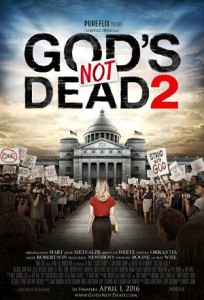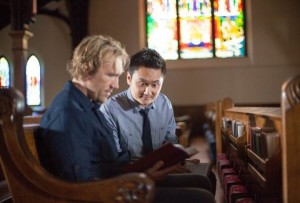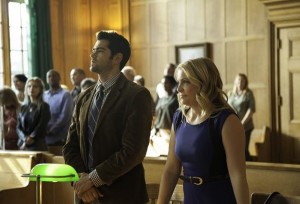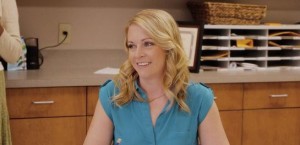 In order to review God’s Not Dead 2 I need to begin with some comments I wrote after seeing the original:
In order to review God’s Not Dead 2 I need to begin with some comments I wrote after seeing the original:
I greatly desire the body of Christ to engage the culture as best we can. Obviously, a great way that we can do this is by utilizing one of the culture’s own venues: the cinema. But we should not be making Christian movies… simply so that we can say there are such things as Christian movies. Our films should be of a quality on par with the best that Hollywood can produce… [Therefore] we must assess Christian films with the same criteria that we would any other movie, even the very best Hollywood has to offer.
The impetus for my comments comes out of a desire to see Christian art live up to its ministerial potential. But that’s the million dollar question: Are Christian films truly cognizant of their own potential?
The premise of God’s Not Dead 2 largely trades on an interaction between Brooke (Hayley Orrantia), a spiritually-seeking, public high school student and her Christian teacher, Grace (Melissa Joan Hart), over whether the words of Jesus are similar to the ideas of Gandhi and Martin Luther King Jr. In order to answer the question with some clarity Grace decides to quote the book of Matthew in a rather innocent fashion; that is, she doesn’t proselytize, she simply answers Brooke’s question. Word gets back to Grace’s administrative superiors and she is suspended for having “preached” in class. One thing leads to another and the ACLU decides to prosecute Grace in public court. The rest of the film tracks how the case plays out.
This movie follows the same format as the original, with one overarching plot surrounded by a series of sub-plots that appear ancillary at first but then attempt to weave in and out of the bigger story. Some familiar faces from the first film are Reverends Dave (David A.R. White) and Jude (Benjamin A. Onyango), the Newsboys, college student Martin Yip (Paul Kwo), and reporter, er… blogger Amy Ryan (Trisha LaFache). The main plot introduces some fresh characters, including, as previously mentioned, Brooke as the grieving teen, Grace as the tortured yet hopeful teacher, Peter Kane (Ray Wise) as the smarmy ACLU lawyer with perfect Grinch-brows, and Tom Endler (Jesse Metcalfe) as the stereotypical, cinematic first-year lawyer who always hates losing. Screenwriters Chuck Konzelman and Cary Solomon return as well as Director Harold Cronk.
 God’s Not Dead 2 is certainly an improvement from the original. The acting is better, the various story arcs are not as wooden and one-dimensional as the first. Even the believability factor has slightly increased compared to the classroom standing ovation and car crash conversion from the original. Some of the sequel seems to follow the exact same plot format, which has its own advantage and disadvantage. Like the original, the overarching plot contains the strongest writing, especially in the dialogue. That’s good because the courtroom is where the audience is invested since it plays on Christian concerns about government censorship when it comes to faith. Unfortunately, like the original, the parallel subplots are tremendously weak and ultimately unnecessary. The clearest example of this is Reverend Dave’s story arc. In an odd “here today, gone tomorrow” scenario, Reverend Dave stumbles his way onto the jury for Grace’s court case only to get appendicitis and then ends up in the hospital for the rest of the film; which raises the question: why is he there in the first place? There is also a pastor’s dilemma (perhaps setup for a third GND?) of turning over sermons to the state for “review”; except, a lot of pastors turn in their sermons and we never see what happens afterward. Again, what was the point?
God’s Not Dead 2 is certainly an improvement from the original. The acting is better, the various story arcs are not as wooden and one-dimensional as the first. Even the believability factor has slightly increased compared to the classroom standing ovation and car crash conversion from the original. Some of the sequel seems to follow the exact same plot format, which has its own advantage and disadvantage. Like the original, the overarching plot contains the strongest writing, especially in the dialogue. That’s good because the courtroom is where the audience is invested since it plays on Christian concerns about government censorship when it comes to faith. Unfortunately, like the original, the parallel subplots are tremendously weak and ultimately unnecessary. The clearest example of this is Reverend Dave’s story arc. In an odd “here today, gone tomorrow” scenario, Reverend Dave stumbles his way onto the jury for Grace’s court case only to get appendicitis and then ends up in the hospital for the rest of the film; which raises the question: why is he there in the first place? There is also a pastor’s dilemma (perhaps setup for a third GND?) of turning over sermons to the state for “review”; except, a lot of pastors turn in their sermons and we never see what happens afterward. Again, what was the point?
My concerns from watching the first film have not been fully assuaged in the sequel. That is, God’s Not Dead 2, like the original, seems to suffer from that pedestrian polish characteristic of Saturday marathons on the Hallmark Channel. Some of the plot in it is downright ridiculous, some of the dialogue is awfully silly, and a lot of the cast sound like they’re doing a cold-reading of the script for an audition. Certain elements in the film are so on the nose mine almost starting bleeding. For example, the protagonist’s name is Grace Wesley. I wonder if they couldn’t find a more obvious set of references, like Hope Calvin or Trinity Aquinas. The villains of the film have some of the most unbelievable lines and seem to have gone to the same sneer coach. “The nail that sticks up gets hammered down,” growls one subpoena official; while greasy Peter Kane hisses (for no good reason), “We’re going to prove once and for all that God is dead.”
 And yet through its imperfections, God’s Not Dead 2 makes some excellent arguments for, not only a teacher’s speech rights, but the existence of God as well. In order to prove that Grace’s comments about Jesus in the classroom were religiously benign, Tom cleverly decides to show that the Bible is not just a religious text but a historical document as well. The goal is to show that Grace was not proselytizing but rather acknowledging Jesus’ words as historical fact. Tom enlists the aid of professor and apologist Lee Strobel (The Case for Faith, The Case for Christ) who argues that the notion of Jesus as a real historical figure (and not a mythological one) is accepted by a wide array of scholars. Tom also brings J. Warner Wallace (Cold Case Christianity, God’s Crime Scene) to the stand in probably the best scene out of the entire film. Wallace argues for the reliability of Scripture by explaining that the Gospel accounts share the same characteristics inherent in eyewitness accounts of cold case homicides. This is the movie’s sweet spot, when it makes the case for the legitimacy and truthfulness of Christianity.
And yet through its imperfections, God’s Not Dead 2 makes some excellent arguments for, not only a teacher’s speech rights, but the existence of God as well. In order to prove that Grace’s comments about Jesus in the classroom were religiously benign, Tom cleverly decides to show that the Bible is not just a religious text but a historical document as well. The goal is to show that Grace was not proselytizing but rather acknowledging Jesus’ words as historical fact. Tom enlists the aid of professor and apologist Lee Strobel (The Case for Faith, The Case for Christ) who argues that the notion of Jesus as a real historical figure (and not a mythological one) is accepted by a wide array of scholars. Tom also brings J. Warner Wallace (Cold Case Christianity, God’s Crime Scene) to the stand in probably the best scene out of the entire film. Wallace argues for the reliability of Scripture by explaining that the Gospel accounts share the same characteristics inherent in eyewitness accounts of cold case homicides. This is the movie’s sweet spot, when it makes the case for the legitimacy and truthfulness of Christianity.
But, again, the question should be asked: Is the film truly cognizant of its own potential? At first I thought the answer was, “No,” because I figured the film’s intended audience is non-believers. I mean, that’s why the apologetics elements are present in this film, for non-believers to witness a cumulative case for the legitimacy of Christianity, right? But, if that were the case, non-believers are going to miss this film because it suffers from the same mistakes that many Christian movies make: some unrealistic scenes, awkward dialogue, poor production, etc. However, as I continued watching the movie, another thought occurred to me. Maybe this movie isn’t for non-believers. Maybe it’s for believers.
Unfortunately, too many apologists (whether of the million dollar or one dollar stripe) can share story after story about how they received push back against apologetics, not from militant atheists, but from their own brothers and sisters in Christ. Even many pastors (particularly youth pastors, sadly) fail to see the need for apologetics in the church. But this rejection of the knowledge requisite to make a case for Christianity in an increasingly hostile culture is the reason why many folks flee the church. Not only that, but rejecting apologetics diminishes the church’s ability to spread the Gospel.
 As I continued watching the film, it started to sink in that maybe this movie isn’t for the discriminating non-believer accustomed to Oscar-worthy screenplays, big-budget production, and authentic performances. Maybe this movie is for Christians who love to flock to films like God’s Not Dead (or Courageous or Fireproof) in solidarity and support of any kind of Christian film. The type of Christian movie-goer that does not discriminate between qualities of production, or pinpoints various flaws in scripts and performances. In other words maybe this film isn’t touting the legitimacy of Christianity to non-believers so much as it is touting the legitimacy of Christian case-making to Christians themselves. If that’s the case, I strongly encourage the entire church to see God’s Not Dead 2 and understand why the need to give an apologetic for the truthfulness of Christianity is so prescient in today’s culture.
As I continued watching the film, it started to sink in that maybe this movie isn’t for the discriminating non-believer accustomed to Oscar-worthy screenplays, big-budget production, and authentic performances. Maybe this movie is for Christians who love to flock to films like God’s Not Dead (or Courageous or Fireproof) in solidarity and support of any kind of Christian film. The type of Christian movie-goer that does not discriminate between qualities of production, or pinpoints various flaws in scripts and performances. In other words maybe this film isn’t touting the legitimacy of Christianity to non-believers so much as it is touting the legitimacy of Christian case-making to Christians themselves. If that’s the case, I strongly encourage the entire church to see God’s Not Dead 2 and understand why the need to give an apologetic for the truthfulness of Christianity is so prescient in today’s culture.

In relation to the dangling narrative about handing over sermons to the government, I thought I had heard that there was an after credits scene of that pastor being arrested. I read that review on April 1, so I concede it may be BS, but it was in the context of a full length review, not just a tweet so I took it to be true.